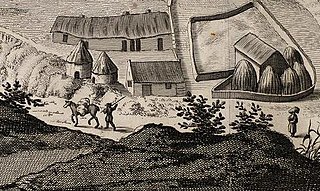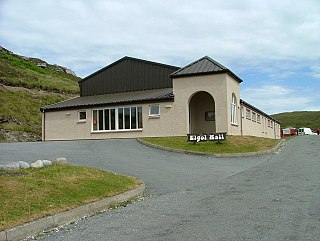
The Highlands is a historical region of Scotland. Culturally, the Highlands and the Lowlands diverged from the Late Middle Ages into the modern period, when Lowland Scots language replaced Scottish Gaelic throughout most of the Lowlands. The term is also used for the area north and west of the Highland Boundary Fault, although the exact boundaries are not clearly defined, particularly to the east. The Great Glen divides the Grampian Mountains to the southeast from the Northwest Highlands. The Scottish Gaelic name of A' Ghàidhealtachd literally means "the place of the Gaels" and traditionally, from a Gaelic-speaking point of view, includes both the Western Isles and the Highlands.

A Scottish clan is a kinship group among the Scottish people. Clans give a sense of shared heritage and descent to members, and in modern times have an official structure recognised by the Court of the Lord Lyon, which regulates Scottish heraldry and coats of arms. Most clans have their own tartan patterns, usually dating from the 19th century, which members may incorporate into kilts or other clothing.

Duke of Sutherland is a title in the Peerage of the United Kingdom which was created by William IV in 1833 for George Leveson-Gower, 2nd Marquess of Stafford. A series of marriages to heiresses by members of the Leveson-Gower family made the dukes of Sutherland one of the richest landowning families in the United Kingdom. The title remained in the Leveson-Gower family until the death of the 5th Duke of Sutherland in 1963, when it passed to the 5th Earl of Ellesmere from the Egerton family.
HALO, halo, halos or haloes may refer to:

The Agricultural Revolution in Scotland was a series of changes in agricultural practice that began in the 17th century and continued in the 19th century. They began with the improvement of Scottish Lowlands farmland and the beginning of a transformation of Scottish agriculture from one of the least modernised systems to what was to become the most modern and productive system in Europe. The traditional system of agriculture in Scotland generally used the runrig system of management, which had possibly originated in the Late Middle Ages. The basic pre-improvement farming unit was the baile and the fermetoun. In each, a small number of families worked open-field arable and shared grazing. Whilst run rig varied in its detail from place to place, the common defining detail was the sharing out by lot on a regular basis of individual parts ("rigs") of the arable land so that families had intermixed plots in different parts of the field.

The Lowland Clearances were one of the results of the Scottish Agricultural Revolution, which changed the traditional system of agriculture which had existed in Lowland Scotland in the seventeenth century. Thousands of cottars and tenant farmers from the southern counties (Lowlands) of Scotland migrated from farms and small holdings they had occupied to the new industrial centres of Glasgow, Edinburgh and northern England or abroad, or remaining upon land though adapting to the Scottish Agricultural Revolution.

Robert McKay Gibson is a Scottish National Party (SNP) politician. He was a Member of the Scottish Parliament (MSP) from 2003 until 2016, first as a Highlands and Islands regional member from 2003 until 2011, then representing the Caithness, Sutherland and Ross constituency from 2011 until 2016.

Crofting is a form of land tenure and small-scale food production peculiar to the Scottish Highlands, the islands of Scotland, and formerly on the Isle of Man. Within the 19th-century townships, individual crofts were established on the better land, and a large area of poorer-quality hill ground was shared by all the crofters of the township for grazing of their livestock. In the 21st century, crofting is found predominantly in the rural Western and Northern Isles and in the coastal fringes of the western and northern Scottish mainland.
In Scotland a factor is a person or firm charged with superintending or managing properties and estates—sometimes where the owner or landlord is unable to or uninterested in attending to such details personally, or in tenements in which several owners of individual flats contribute to the factoring of communal areas.

Strathnaver or Strath Naver is the fertile strath of the River Naver, a famous salmon river that flows from Loch Naver to the north coast of Scotland. The term has a broader use as the name of an ancient province also known as the Mackay Country, once controlled by the Clan Mackay and extending over most of northwest Sutherland.

SSE plc is a multinational energy company headquartered in Perth, Scotland. It is listed on the London Stock Exchange, and is a constituent of the FTSE 100 Index. SSE operates in the United Kingdom and Ireland.

Elgol is a village on the shores of Loch Scavaig towards the end of the Strathaird peninsula in the Isle of Skye, in the Scottish Highlands.
The CDLSE is made by Divex in Aberdeen, Scotland. It is an electronic closed circuit rebreather designed to be silent and non-magnetic. It allows diving to 60 metres (200 ft) using air as diluent, or up to 120 metres (390 ft) using heliox and trimix.

The Highland Clearances were the evictions of a significant number of tenants in the Scottish Highlands and Islands, mostly in two phases from 1750 to 1860.
Elizabeth Gordon may refer to:
Events from the year 1853 in Scotland.
Events from the year 1819 in Scotland.

Slum clearance in the United Kingdom has been used as an urban renewal strategy to transform low-income settlements with poor reputation into another type of development or housing. Early mass clearances took place in the country's northern cities. Starting from 1930, councils were expected to prepare plans to clear slum dwellings, although progress stalled upon the onset of World War II.

The Defence Diving School is a joint service diver training centre on Horsea Island in Portsmouth Harbour, run by the Royal Navy.
This page is based on this
Wikipedia article Text is available under the
CC BY-SA 4.0 license; additional terms may apply.
Images, videos and audio are available under their respective licenses.











